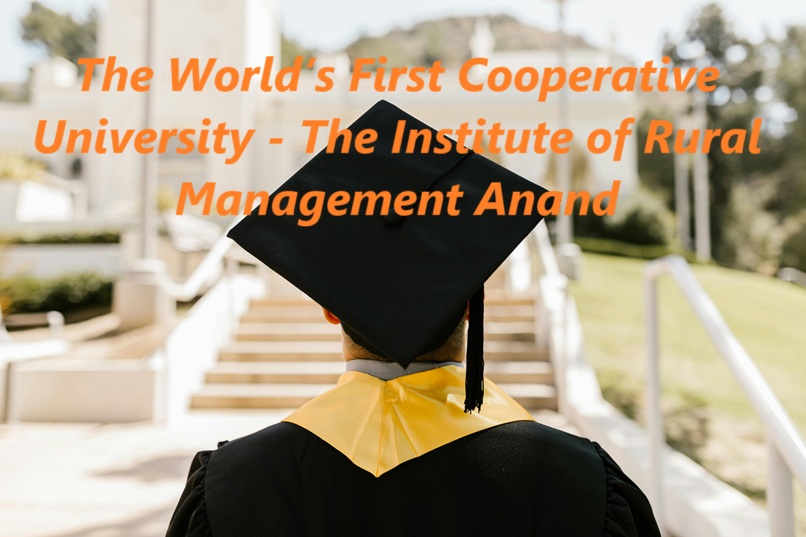The Institute of Rural Management Anand (IRMA)

The Institute of Rural Management Anand (IRMA) is a pioneering institution that has revolutionized rural management education in India. Founded in 1979, IRMA was established with the vision of professionalizing rural development and cooperative management. As the world’s first cooperative university, IRMA has made significant contributions to the field of rural management, producing skilled professionals who drive socio-economic change in rural communities. This article explores IRMA’s history, academic offerings, career prospects, and its role in shaping the future of rural development.
The Founding Vision of IRMA
IRMA was conceived by Dr. Verghese Kurien, the mastermind behind India’s White Revolution, which transformed the country into the largest producer of milk in the world. Recognizing the need for specialized rural management education, he envisioned an institution that would integrate management principles with rural development.
With initial funding and support from the National Dairy Development Board (NDDB), the Swiss Agency for Development and Cooperation (SDC), and the Government of India, IRMA was established in Anand, Gujarat. It was designed to provide management education tailored specifically for rural enterprises, cooperatives, and development organizations, bridging the gap between urban management practices and rural realities.
IRMA’s Academic Programs
Post Graduate Diploma in Management (Rural Management) [PGDM-RM]
IRMA’s flagship two-year residential program is one of the most sought-after courses in rural management. This program blends classroom learning with extensive fieldwork, ensuring students gain hands-on experience in rural settings. The curriculum covers essential management disciplines such as:
Financial and resource management
Rural marketing strategies
Agricultural and cooperative business management
Social entrepreneurship
Sustainable development practices
A unique feature of this program is the Village Fieldwork Segment (VFS), where students spend time in rural areas, engaging directly with communities to understand their challenges and propose sustainable solutions.
Fellow Programme in Management (Rural Management) [FPM-RM]
This doctoral-level program is designed for individuals aspiring to contribute to academic research and policy development in rural management. It encourages in-depth studies in:
Agribusiness and cooperative management
Livelihood strategies and rural employment
Sustainable rural development models
Policy research and impact assessment
Executive Post Graduate Diploma in Management (Rural) [PGDM-X (RM)]
Catering to mid-career professionals, this executive program is tailored for those looking to enhance their leadership skills in the rural development sector. The program focuses on:

Strategic management for rural enterprises
Leadership and governance in cooperatives
Digital transformation in rural markets
The Significance of IRMA in Today’s World
Bridging the Urban-Rural Divide
As economies evolve, the gap between urban and rural development widens. IRMA plays a critical role in equipping professionals with the skills necessary to implement inclusive development models. Its graduates drive policy changes, manage large-scale cooperative businesses, and lead organizations that focus on rural prosperity.
Emphasizing Sustainable Development
With climate change and resource depletion threatening rural economies, IRMA integrates sustainability principles into its teaching. The focus on sustainable agriculture, renewable energy solutions, and ethical business practices ensures that graduates contribute to environmentally conscious rural development.
Empowering Cooperatives and Social Enterprises
IRMA champions the cooperative movement by training professionals who manage farmer cooperatives, self-help groups, and microfinance institutions. These organizations, in turn, empower rural communities by providing fair wages, market access, and financial inclusion.
Career Opportunities for IRMA Graduates
Graduating from IRMA opens doors to a wide range of career opportunities. The institution has a strong placement record, with students securing positions in sectors such as:

Agribusiness and Food Processing
Many graduates join leading agribusiness firms that focus on sustainable agriculture, food supply chain management, and rural marketing strategies.
Microfinance and Rural Banking
Financial inclusion is a major focus area for IRMA graduates, with many taking up roles in rural banking institutions, microfinance organizations, and cooperative credit societies.
Development and Policy Research
Alumni often work with government bodies, NGOs, and international organizations that design and implement rural policies. Their expertise is instrumental in shaping policies related to agriculture, health, and education in rural areas.
Social Entrepreneurship
Many IRMA graduates launch their own social enterprises, focusing on education, healthcare, sustainable farming, and rural infrastructure development. The institute provides incubation support for innovative ideas that can transform rural livelihoods.
Corporate Social Responsibility (CSR) Roles
With CSR becoming an integral part of business operations, IRMA graduates find opportunities in multinational corporations managing rural development initiatives, sustainability programs, and inclusive business models.
Life at IRMA: A Blend of Learning and Innovation
IRMA offers a vibrant campus experience, fostering intellectual growth and holistic development. The 60-acre green campus is equipped with state-of-the-art facilities, including:
Modern classrooms and digital libraries
Research centers focusing on rural innovation
Student clubs promoting leadership and social impact
Strong mentorship and alumni network
The institute encourages participation in various extracurricular activities, from cultural festivals to social impact projects, ensuring students develop essential soft skills alongside their academic pursuits.
Admission Process and Eligibility Criteria
Admission to IRMA is highly competitive. The eligibility criteria for its flagship PGDM-RM program include:
A bachelor’s degree with at least 50% aggregate marks (45% for SC/ST/OBC candidates)
A valid score in national entrance exams such as CAT, XAT, or CMAT
A Written Ability Test (WAT) and Personal Interview (PI) for shortlisted candidates
The selection process is designed to assess candidates’ analytical skills, leadership potential, and commitment to rural development.
Addmission open for this year in various programs and for the application deadline is 28-Feb-2025. So rush and apply immediately.
Scholarships and Financial Aid
IRMA offers financial assistance to meritorious and economically disadvantaged students. Various scholarships are available through government schemes, private organizations, and the institute’s internal funds. These initiatives ensure that financial constraints do not hinder access to quality education.
Research and Consultancy at IRMA
IRMA is a hub for research and consultancy projects focused on rural transformation. The institute collaborates with government agencies, international development organizations, and grassroots institutions on projects related to:
Rural health and nutrition
Water resource management
Climate change adaptation in agriculture
Digital innovation in rural enterprises
Global Partnerships and International Exposure
IRMA’s collaborations with international universities and organizations provide students with global perspectives on rural management. Exchange programs, joint research initiatives, and international internships offer exposure to best practices from different parts of the world.
Conclusion
IRMA is much more than an academic institution; it is a movement that empowers individuals to drive rural transformation. By combining academic excellence with real-world exposure, IRMA produces professionals who contribute meaningfully to society. For those passionate about social impact, sustainable development, and cooperative enterprises, IRMA offers the perfect platform to build a fulfilling career.
Disclaimer
This blog is intended for informational purposes only. While every effort has been made to ensure accuracy, details such as admission criteria, course structures, and placement opportunities may change over time. Prospective students and stakeholders should visit the official IRMA website – https://irma.ac.in/ or contact the institute directly for the most up-to-date information. The views expressed in this article are independent and do not represent the official stance of IRMA or any affiliated organizations.


Recent Comments